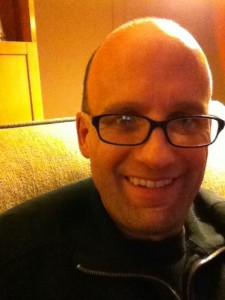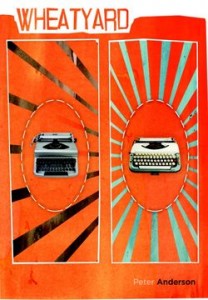 Peter Anderson was never short of ideas for stories, be it short fiction or novels. A voracious reader, he spent years mulling over ideas and plots, characters and setting and images, sifting through and arranging these foundations of narrative in his head.
Peter Anderson was never short of ideas for stories, be it short fiction or novels. A voracious reader, he spent years mulling over ideas and plots, characters and setting and images, sifting through and arranging these foundations of narrative in his head.
But it wasn’t until he began commuting by train from Joliet for his job in the heart of Chicago’s downtown financial district that he unearthed perhaps the most valuable aspect for any fiction writer: time. From a seat on a commuter train, Anderson slowly began to transcribe his scribbled notes into more full-formed fictions, turning what can be a hectic and hazy morning slog to the office into uninterrupted bouts of creativity and clarity.
It’s through these short fits and spells of writing that Anderson has managed to publish a number of short stories, including pieces in the recently released anthologies On the Clock: Contemporary Short Stories of Work, and Daddy Cool: An Anthology of Writing By Fathers For and About Kids.
Anderson also recently published his debut novel, Wheatyard (Kuboa Press), the story of a recent college grad who drifts aimlessly through the post-graduation blues until he finds himself wrapped up in and obsessed with the mystery of the novel’s title character. Like most of his work, the novel was completed in small windows of time, usually from inside the swaying roar of an early morning or late-afternoon train car.
Earlier this summer, Anderson and I sat down for a Sunday morning Internet chat session to discuss his work. He was getting ready to mow his lawn and I also had yard work on my docket. As it turns out, our looming non-writing-life concerns made for an interesting conversation about making time to write, and how to prioritize the creative process.
Interview:
Nick Ostdick: You’re the first writer I’ve interviewed who cut their teeth outside of academia, meaning you don’t have any formal schooling in writing, no MFA experience, etc. So can you talk a bit about how you came to fiction? Was it short stories or novels that drew you initially?
Peter Anderson: For many writers, it seems that short stories are usually the gateway drug into fiction writing, but the first fiction I attempted were novels. My first novel was clumsy and melodramatic and I only managed about twenty pages of it before giving up. The second was this historical pioneer epic written for NaNoWriMo [National Novel Writing Month] in 2002, which I also never finished. I don’t really know why I started with novels, other than maybe I preferred reading novels to short stories. But after those first two novels bombed, I slowly gravitated to short stories, partly because I was intimidated by the challenge of finishing something so big and complicated.
Not that stories are any easier to write, of course, but just due to the length it was easier for me to finish the first draft of a story rather than the first draft of a novel. At the time, with stories, I felt like I could dabble in several different narratives and go with the one that most interested me. Approaching novels like that would have been impossible.
You’ve said that you didn’t start writing seriously until about ten years ago, when you started commuting by train to Chicago for work from Joliet, traveling an hour each way. Is it safe to say that daily or semi-daily short-burst writing sessions are part of your overall process? Because you’ve mentioned in other interviews that Wheatyard took many years to complete.
Yes, these short-burst writing sessions were very common when I started writing—back then, I’d even duck out of the office in the afternoons for quick half-hour bouts. I think I had so many stories ideas bottled up in my head that these binges were a necessity.
Your novel begins: “Wheatyard came through as a storm, sudden and jarring, then gone not long after.” The book then proceeds to pay off on that opening with a lean, compact story. Given how much we’ve discussed real-world time constraints for writing fiction, was this why you chose to keep the book small in terms of time and place?
Generally, I prefer novellas and short novels that tell a small story vividly and thoroughly, usually from a single point of view and a single setting. That’s partly due to my personality—I’m an introvert—and my short attention span, which often leads me to losing interest in a book after a few hundred pages.
 So I prefer shorter novels in general, which undoubtedly influences my writing style. And with Wheatyard, the specifics of the story almost dictated that it be a novella. Much of the narrative involves the narrator puzzling over the life of the reclusive title character. The narrator is a fairly passive individual, and never really gets aggressive about delving into Wheatyard’s life, especially his past. And Wheatyard is always evasive about his past, and certainly not going to volunteer much information on his own. So with a passive first-person narrator and a guarded protagonist, it makes sense to me that Wheatyard’s story would never be completely revealed. Even when Wheatyard starts to open up at the end, he abruptly pulls back as he’s about to reveal the most painful moment of his difficult life, and the narrator runs out of time to delve in any further. To me the best novels are the ones that don’t explain everything, but gives the reader just enough hints about the full story to keep the reader questioning and thinking about the story long after it’s finished. I know everything that happened in Wheatyard’s past, but I’m not telling. I trust the reader to come up with their own conclusions.
So I prefer shorter novels in general, which undoubtedly influences my writing style. And with Wheatyard, the specifics of the story almost dictated that it be a novella. Much of the narrative involves the narrator puzzling over the life of the reclusive title character. The narrator is a fairly passive individual, and never really gets aggressive about delving into Wheatyard’s life, especially his past. And Wheatyard is always evasive about his past, and certainly not going to volunteer much information on his own. So with a passive first-person narrator and a guarded protagonist, it makes sense to me that Wheatyard’s story would never be completely revealed. Even when Wheatyard starts to open up at the end, he abruptly pulls back as he’s about to reveal the most painful moment of his difficult life, and the narrator runs out of time to delve in any further. To me the best novels are the ones that don’t explain everything, but gives the reader just enough hints about the full story to keep the reader questioning and thinking about the story long after it’s finished. I know everything that happened in Wheatyard’s past, but I’m not telling. I trust the reader to come up with their own conclusions.
So, how much of a piece of writing is driven by intention and how much of what ends up on the page is happening subconsciously?
I might jot down notes here and there, but other than that I do no pre-writing, and never outlining. Outlining seems like it would suck all of the mystery and fun about creating a narrative. Most of what I write is from the subconscious, or more accurately consciousness fueled by the subconscious. Basically, I just start writing and see what happens. Which is both good and bad. I first starting writing Wheatyard for NaNoWriMo in 2005, and with the emphasis in that project being on getting as many words written as possible, planning—and even full awareness of what you’re writing—goes totally out the window. So, when I finally finished the first draft of the book a year or two later, I really didn’t have a good idea of what I had actually written. I had a promising story, but it was quite a mess. So it wasn’t until after the second draft that I finally surveyed the thing in its entirety. I read through it slowly, jotting down notes as I went, and only after that was done did I have a firm idea of what areas needed more work. That’s a slapdash way of writing, I know, but it’s probably the only way that works for me.
I know it’s a cliché, but so many first novels are heavily autobiographical. How much of Peter Anderson found its way into the novel? How much of you as a human being finds its way into your work in general?
The initial portion of the narrator’s situation actually happened to me—after getting my M.B.A. from the University of Illinois, I was stuck in Champaign for the summer, preferring to stay there until my apartment lease ran out, in the hope that I would find a job somewhere and continue my independent life instead of having to move back home with my parents. But everything else within the book was purely fictional. While there are a lot of autobiographical aspects to the book, I didn’t want it to sound like I was just writing about myself—here’s my life during that sweltering summer in Champaign, oh, and here’s an interesting person I met there. So the biggest challenges during revision was fleshing out the narrator and making him more than just a cipher for the telling of Wheatyard’s story.
In general, I consciously try to avoid drawing on specific aspects of my life, but it seems my experiences, opinions, and personality traits inevitably work their way in somehow. I think all fiction is autobiographical to some degree—parts of the author always find their way into the fiction.
In addition to the novel and a number of published short stories, you also run a literary blog called Pete Lit, where you often engage critically with books ranging from canonical texts to current bestsellers to independent press projects. Does keeping up with this blog compliment your work? Distract from it? Is that a fine balancing act going on?
I wouldn’t say I engage critically with the books I read—I’m not a critic, just an enthusiastic fan. I make no claims to objectivity. When I read books I love, I want to share them with others, even if the writer is a friend or the book is less than perfect. Many times I won’t even be able to put into words why others should read a given book, just that I dug it and maybe they will too. Running the blog and writing about others’ books really makes me think about what kind of books I enjoy most. My serious writing and the blog started at almost the same time, and at first I regularly posted fictional vignettes based on things I had observed in my everyday life, and so early on the writing and blog definitely complimented each other. But these days I don’t write nearly as much original fiction on the blog, which has become more of a repository for excerpts from books I’ve been reading.
Speaking of distractions, you’re a full-time financial analyst in Chicago. You have a wife and children. You have to sleep. You have to eat. And while I don’t have any children, I too have a 40-hour per week job, a wife, a home-life, etc, and while these things are incredible valuable to me, some days I find it’s a real push to find the inspiration and determination to write. Given the volume of work you’ve produced over the years, I’m wondering how you negotiate this relationship?
When I’m working on something, I carve out time whenever I can: on the train, or early in the morning when my family is still asleep, or in the evening while dinner is on, or whenever I can, really. At home, my wife and daughter are first and foremost, so I won’t sacrifice time with them to hole up somewhere to write. I’ve never had one of those marathon writing sessions I always hear other writers having. But, like I said earlier, these short bursts seem to work best for me.
Talk a little about your publisher, Kuboa Press. They seem like an interesting indie outfit and I’m curious as to how you got hooked up with them?
Kuboa is a solo gig run by Pablo D’Stair that puts out literary fiction specifically in the form of novellas and short story collections. I first found out about Kuboa from Mel Bosworth, whose novella Grease Stains, Kismet and Maternal Wisdom was published by Pablo at his previous venture, Brown Paper Publishing. After shopping Wheatyard around to publishers for almost two years to a very underwhelming response, I suddenly remembered Kuboa and especially Grease Stains, which I realized had general stylistic similarities (realistic, straightforward, understated narrative) to Wheatyard, and it occurred to me that any publisher who liked Grease Stains might like Wheatyard as well.
I dropped Pablo an email asking if he was still reading manuscripts and he said yes, and a month or two later when I followed up, he said he loved Wheatyard and offered to publish it. The rest is history, or semi-history.
Now that the book is out, are you working on anything right now? What’s coming up for you in terms of publications, readings, etc?
Early this year I finished a story collection, Where the Marshland Came to Flower, which is set entirely in a diverse range of Chicago neighborhoods. With Wheatyard having come out in April and needing all of my meager promotional ability, I’ve been putting off sending the story collection around to publishers but will start doing so soon.
Until recently I had been thinking about a trio of novellas set in a fictional northern Illinois town, but the narrative I’ve imagined so far isn’t nearly compelling enough to fire me up. I might step back and write an individual short story or two—the prospect of that is much less intimidating than those novellas, and thus the stories are much more likely to be finished eventually. Though if you ask me again a month from now, I’ll probably be thinking about something completely different.
Further Links and Resources:
- For more on Peter Anderson and his work, check out his lit blog, Pete Lit.
- Here’s Ben Tanzer’s review of Wheatyard at The Nervous Breakdown.
- Or read Anderson’s story “Clean and Bright” at Joyland.
- And be sure to check out some of Nick Ostdick’s other literary interviews for FWR.






